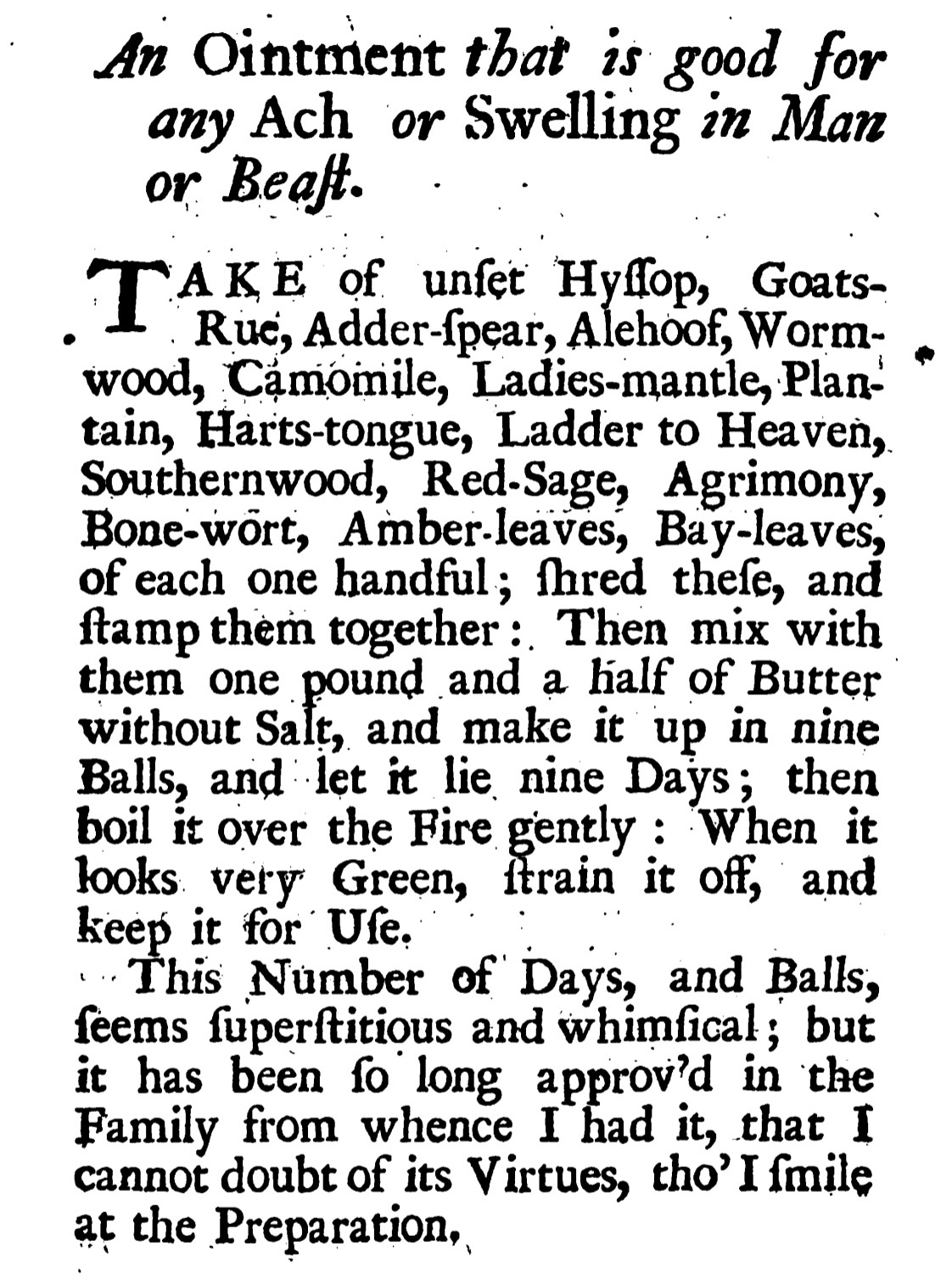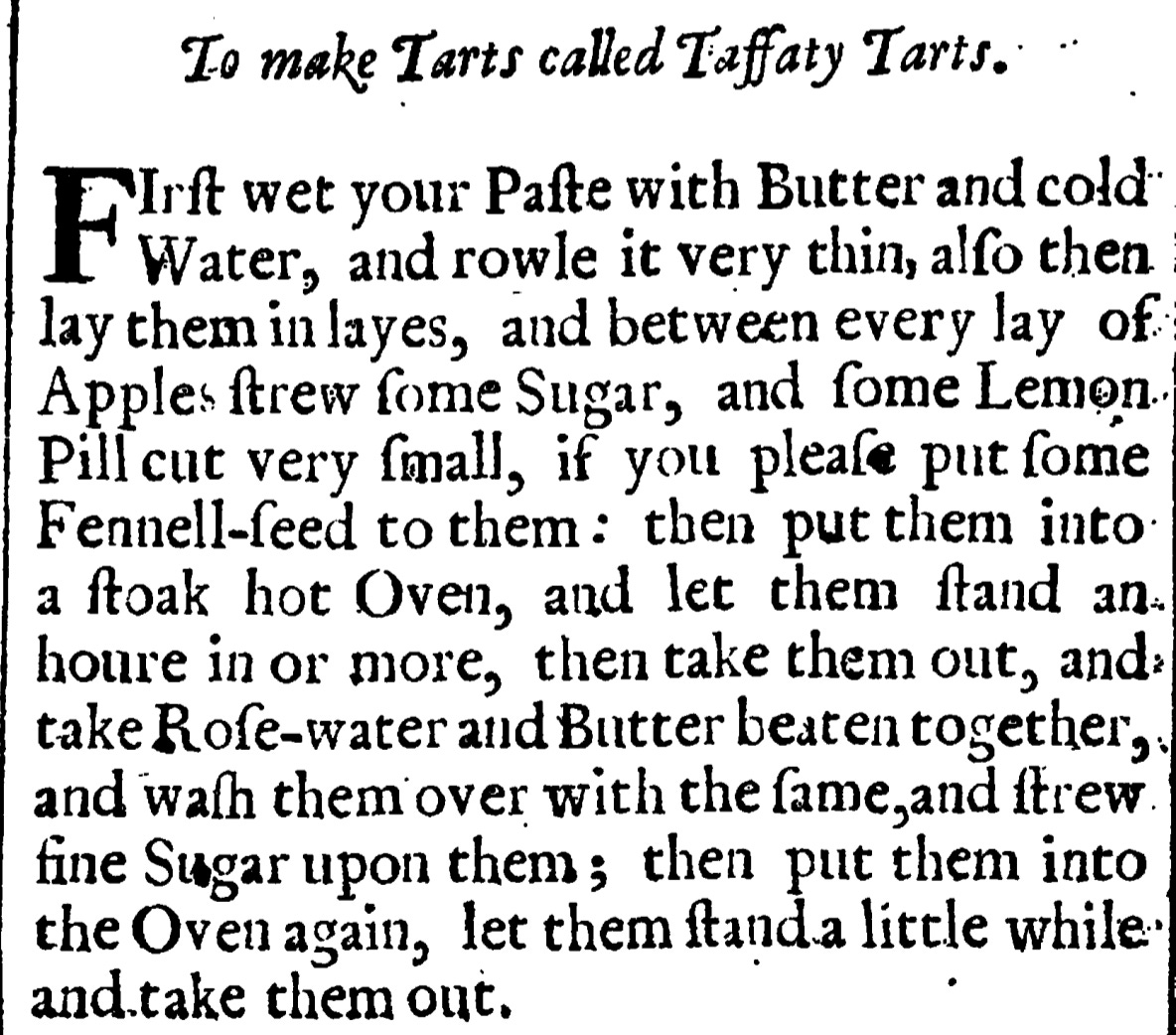From Recipe Thoughts to Taffaty Tarts
Via Two Fat Ladies, Recipes as Stories, Flavour as King, a Fairy Kidnap Attempt in the Highlands and an Ointment that is Good for any Ache or Swelling in Man or Beast
Dearest Gentle Reader,
A lovely May greeting to you all, and I hope that the world is currently treating you and your’s in a kindly fashion. I think after all this time writing to you (nearly a year) we can share our thoughts about recipes or in the words of the Two Fat Ladies, receipts. I should perhaps have saved this for my anniversary newsletter (next week) but I honestly haven’t thought that far ahead. I should perhaps have thought a bit more about it as its a special anniversary but it’s too late now. Hopefully I will have an epiphany between then and now and treat you all to something particularly gorgeous.

Lets get back to recipes which were, as the more archaic term suggests, originally a form of shopping list or a list to help with stocktaking your provisions. The earliest ones didn’t have much in the way of description at all as it would have been expected that you would know what to do with that list to make that dish. You would have been taught to make it in the best traditions of teaching using the ‘watch someone else a couple of times and then have a go yourself’ technique. There was unlikely to have been a book. It is in fact that much cookery continued in this way outside of the homes of the well-to-do. The affordable cookbooks were meant to assist housekeepers and cooks in providing the best dishes for their mistresses and dealing with unusual ingredients. They weren’t meant for the masses.
That changed somewhat in the 19th Century but up until that point cookery and its lessons were very much in the oral tradition. Food was too precious to be risked so mothers taught their daughters how to use what ingredients they had to hand to produce the tastiest food that stretched as far as possible. Cooking was the ultimate survival skill as it meant that you could use up every precious item and/or store it until was needed via pickling, brining or fermenting. Food waste didn’t exist amongst the poor or even the growing middle classes. There was always something that could be done with scraps even if that was only feeding the pig.
Cookery books and the recipes in them were often about status. A certain type of person cooked (or had food cooked for them) from certain types of books and you could probably tell their class from the recipes they used. Just as an example, books with recipes for game were meant for those with land such as the nobility and the gentry as no-one without had easy access to those meats or at least not legally. There probably wasn’t a poacher’s cookbook when in theory you could be transported for poaching (there is one now though). Cookbooks that were more aspirational had mock game recipes which were certainly creative.
I suppose you could say that recipe books are still about status, which to an extent they are. Its a privilege just to be able to access certain ingredients and then cook with them because something sounds delicious rather than just buy what you know will fill up your family. Buying the best food I can afford is one of my two indulgences and at one end of the month I might buy perfect heritage tomatoes to enjoy sensational pan con tomate with perfect garlicky sourdough toast, good artisan cheeses accompanied by a glorious glass of expensive red. However, the odds are when I reach that point when there is more month than money I’ll be choosing Greek style salad cheese instead of feta to make a recipe I’ve read by one of my favourite authors based on the absolute knowledge that neither Nigel or Nigella will care what I have done to their cooking creation.
I don’t really buy the books that start by recommending Greek style salad cheese though, not because of my perceived status but because I want the books written by people that love food and who write recipes that tell stories about ingredients and their travels and relationships. Some people believe that it’s aspirational to read these books, that cooking these recipes is a shorthand to indicate to the world where you stand in it. I certainly don’t think that’s true for everyone, it isn’t for me.
These books cast a spell over me in just the same way as a good tale. Claudia Roden, Diana Henry, Nigel Slater, Nigella, Olia Hercules, Olivia Potts, Ella Risbridger, Ruby Tandoh and so many others I can’t even begin to fit them all in here, tell me stories, they don’t write shopping lists. Their recipes and writings aren’t there just for the heritage tomato and artisan cheese days. They take me to another world and inspire my imagination even at the wrong end of the month when I’m struggling to be creative with the slightly sad leftovers of that once perfect artisan cheese and the weirder vegetables left in my Oddbox.
My last word on this subject today is that as well as the magical words of these fabulous writers I want the recipes that I read or make to be written for flavour. It’s wonderful if they bring health benefits or are particularly frugal but flavour is what it’s all about. I am currently reading a lot of books about creating herbal teas and their writers should definitely take note.
Would you like a story after all that? This is literally a fairy tale from Gibbings Folklore & Legends of Scotland:

In the olden times, when it was the fashion for gentlemen to wear swords, the Laird of Balmachie went one day to Dundee, leaving his wife at home ill in bed. Riding home in the twilight, he had occasion to leave the high road, and when crossing between some little romantic knolls, called the Cur-hills, in the neighbourhood of Carlungy, he
encountered a troop of fairies supporting a kind of litter, upon which some person seemed to be borne. Being a man of dauntless courage, and, as he said, impelled by some internal impulse, he pushed his horse close to the litter, drew his sword, laid it across the vehicle, and in a firm tone exclaimed:
“In the name of God, release your captive.”
The tiny troop immediately disappeared, dropping the litter on the ground. The Laird dismounted, and found that it contained his own wife, dressed in her bedclothes. Wrapping his coat around her, he placed her on the horse before him, and, having only a short distance to ride, arrived safely at home. Placing her in another room, under the care of an attentive friend, he immediately went to the chamber where he had left his wife in the morning, and there to all appearance she still lay, very sick of a fever.
She was fretful, discontented, and complained much of having been neglected in his absence, at all of which the Laird affected great concern, and, pretending much sympathy, insisted upon her rising to have her bed made. She said that she was unable to rise, but her husband was peremptory and having ordered a large wood fire to warm the room, he lifted the impostor from the bed, and bearing her across the floor as if to a chair, which had been previously prepared, he threw her on the fire, from which she bounced like a sky-rocket, and went through the ceiling, and out at the roof of the house, leaving a hole among the slates.
He then brought in his own wife, a little recovered from her alarm, who said that some time after sunset, the nurse having left her for the purpose of preparing a little caudle, a multitude of elves came in at the window, thronging like bees from a hive. They filled the room, and having lifted her from the bed, carried her through the window, after which she recollected nothing further, till she saw her husband standing over her on the Cur-hills, at the back of Carlungy. The hole in the roof, by which the female fairy made her escape, was mended, but could never be kept in repair, as a tempest of wind happened always once a year, which uncovered that particular spot, without injuring any other part of the roof.
Always keep some cold iron in the bedroom to avoid this sort of thing would be my advice, also useful for deterring burglars and home invaders although ‘I kept the iron bar under the bed to deter fairies, your honour’ could be a tricky line of defence to pursue should you be a bit too vigorous using it towards your burglar.
We should now consider our vintage remedy which I must admit is a little unusual but how exciting would be if it was as effective as its title? I think I may give it a miss though as I’m no herbalist and I’d worry I’d be doing more harm than good. Also, I’m not sure I fancy a butter based ointment that you need to make sure is very green before it is effective, no matter how many useful herbs are in it or how whimsical it sounds. The remedy is taken from A Collection of over Three Hundred Receipts in Cookery, Physick and Surgery from 1714.
These tarts on the other hand, I could definitely get behind and not just because I love the name which refers to the luxury fabric and reflects the ethereal nature of these iced and delicate apple tarts. My version is from The Compleat Cook in 1662 but it was also in the 1658 edition.
So with that, Gentle Reader, I must bring this letter to a close. Please don’t hesitate to get in touch via the comments or via any of my social media profiles/my website . If you have enjoyed this and would like to read further such nonsense and have not yet subscribed, please don’t hesitate to subscribe for free at the button below. You’d be very welcome and it would be a joy to write to you.






